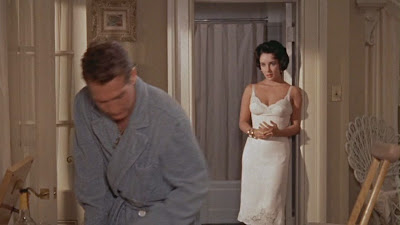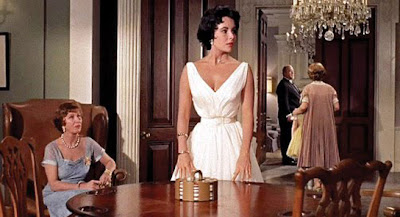понеділок, 11 квітня 2011 р.
Mendacity A-Go-Go: Liz vs. the Little Monsters
Posted on 08:45 by jackichain
I'll never forgive Richard Brooks for the Gaspar Noe-ish ending of LOOKING FOR MR. GOODBAR (1977, my review here), but his unflinching eye comes in handy when dealing with the mythic component of Tennessee Williams, and his dispassionate objectification of Paul Newman's unnerving sexuality and Roman statue profile has a unique fetishistic kick perfectly in line with Williams' rough trade tendencies. IN CAT ON A HOT TIN ROOF (1958) and in the undervalued SWEET BIRD OF YOUTH (1962), Brooks finds in Newman the gay eye candy grand prize of Williams' hard drinking man-children, then lets genius character actors bounce off the bronze.
But the big early scene in ROOF of Maggie chattering away and Brick just drinking and laying around, muttering passive-aggressive things like "Do they, Maggie?" infuriates me, every time, and keeps me from loving the film like I love NIGHT OF THE IGUANA or SUDDENLY LAST SUMMER. Newman seems neither drunk nor closeted, and Taylor seems too poised and mannered to be really in heat. By comparison, dig up the old Showtime production with Jessica Lange (above) and Tommy Lee Jones! I haven't seen it since it premiered on cable in the 80s--but I watched it a peck of times back then: a young, pre-celebrity Lange is damn hot in the negligee dress, and Jones mixes it up with Rip Torn as Big Daddy and Lang with a ferocity and cagey weariness that Newman lacks in Brooks' version.
I know it's sacrilege but Liz and Paul seem to lack connective chemistry, so it's strange to me that the long Brick-Maggie bedroom scene is the most famous and recognized part of ROOF (not so strange perhaps considering how hot Liz looks straining at the seams of her white negligee). Maybe I'm off the mark (there's also the stapled-on-by-the-code happy ending) but for me this isn't a romantic drama as much as tale of masculine redemption: Newman and Burl Ives slay me every time in the heavy showdown in the troll king basement that comes later on, and the real scene-stealer is Jack Carson when he finally lets some tears show in his voice it's such a shock and he seems so honestly frail in one moment, warts and all, that the rest of the film fades around him suddenly in a mendaciously artificial overacting haze. Fault it as you may for the now family therapy 101 moments of dialogue and symbolism (the crutch and alcohol, stairs, ice cream), it's the kind of film that holds your hand and invites you to peer--without maudlin weepiness--deep into the harrowing void of mortality the way few films have done before or since. And if you have a dad with cancer who you all call 'Big Daddy' who has a bit of a Welles or Ives gravitas then you will, like me, be devastated.
The family basement is packed with souvenirs and statues from a Cook's tour to Europe Big Daddy took with his wife, who takes after the mendacity side of the family. What could be just a cliche'd rendition of Charles Foster Kane's big ole basement becomes a mythic underworld, with Burl Ives as a kind of pot-bellied troll king, and cobwebs on tall lamps draped to resemble stalagmites. There's moments for Burl and Paul to each smash stuff in a clutching heart attack way as their illusions of immortality and glory are dashed on the altar of passing time, irrelevance, the horror of all existence, and then are redeemed, sweaty and wrecked, by the icky area they fear and recoil from the most - genuine feeling and human love. And you know that to Williams a hypodermic full of morphine resting on a crate isn't just a symbol; it's something to drool over. Drugs don't help you escape from reality in a Williams effort, they help you confront it head on.
Wait, which reality are we talking about? Not the 9-5 family values no-neck monster reality--it helps turn down the volume on that--but the 'holy shit here comes the scythe' reality. In Williams' plays, its the whole mindless reproductive Christian-patriarchal family dynamic that's an escape from that truer, grimmer reality, the inescapable gravity of death. And if you don't make amends now, you're fucked. And incessant off-key renditions of "Dixie" are not amends.
I've had those breakthroughs before with my own big daddy, maybe you have too -- the late night boozy moments of truth when you can look at him and suddenly see--instead of a paragon or symbol of authority--a frail, aging human, ever trying to escape his future by ignoring his present, and you see yourself that way, too, and if alcoholism runs in your veins you can bond quite well until the hungover morning when you scarcely remember the progress you made. Like many of Williams' plays, it seems made for me, made for a brooding drunk writer by a brooding drunk writer - with booze as the thing that both gives you the brio to stare into that void, and at the same time shorten the distance to the bottom, where the teeth are, in the base of the Sebastian's Venus fly trap garden. Click!
I wonder if the whole first half is intentionally shrill, meant to wear you down with the constant songs sung by the no-neck monsters to welcome Big Daddy home. We identify totally with Brick hiding out in the bedroom, as Taylor's Maggie rants on and on in her one-note voice. And we identify with Big Daddy when he rejects the ugly brood of Gooper for Maggie's hip convertible, and his irritation with the non-stop dinner songs which his wife makes such a show of enjoying. There's also no accident that the ROOF is in the title, as the different levels of the family estate are packed with meaning, from the elevation of the bedroom to the lowest ebb of the basement and the killing floor living room and the convertible quicksand driveway. And when the children go off to bed, and the drama starts in earnest, we above all note the the quietude like a weight removed from our shoulders when their no neck noise stops. It's that 'click.' Brick was waiting for it, and now we realize we too were waiting for it.
The rejection of messy children is one of the few things I connect with in the Apollonian, as per Camille Paglia, vs. the chthonic. Gayness has been one-note in the media since Williams' day, and thanks to PC indoctrination, gays are now the opposite of the depraved lunatics they were in the 1950s; now they're just saintly victims longing to become legally-wed adoptive parents. Either/or but on no level are homosexuals allowed to be properly ambiguous: mercurial, both good and bad, like everything else on this fucked up planet. A negative portrayal will get you a sack full of angry letters; a positive portrayal a snoozing audience and bizarre Christian right wing protests. Can you win?
Few artists today bother to try, to plumb the depths that Camille Paglia writes about in her Sexual Personae, to explore gayness as the rejection of the feminine body, the denial of procreation, involved in the Apollonian. For me and a very few others, the whole media portrayal in things like TV's American Family and The L Word are deeply offensive because they are a betrayal of all that was good and pure about the Apollonian. Now everyone's a breeder, queer eyes or no, and kids are saints by default, suffocated in round-the-clock hyper-monitoring even as their parents aren't home (they have to work overtime to afford nannies and after-pre-school sewing lessons).
In that sense it's illuminating that Brick--who may or may not have fooled around with his late pal Skipper-- is the only one to ask "why!?" in relation to Big Daddy's edict to reproduce. He has a point and it's a harrowing one: why bother to procreate just so some idiotic legacy of wealth and possessions can go on? Where's the meaning?
As someone who reacts with mute horror to the surplus of children in my Park Slope neighborhood, I relate to Brick's question; and as someone who, because he has no kids, gets to stare into the terrifying mortal mirror without the worry being channeled into anxiety about providing for the kids after I'm gone. And as an alcoholic writer aware of the repulsion aspect of sexuality on a visceral level, I relate. And I relate to Liz's scheming to keep the no-neck monsters off that nice piece of land. Like her I want to drown them in ice cream, choke them on their own stupid toy guns..
Looking at the film in relation to Williams' other works we see a running theme of the grabby, uncouth, poor relations who breed willy nilly and are a pox upon the land with their unconscious brutishness. Against this grain, this unceasing flow of children into the future, stand a few 'whole' souls, like Maggie and Big Daddy, and Brick, Blanche, Mrs. Stone, Violet Venable, Rev. T.L. Shannon, and a boozy actress named Alexandra Del Lago.
God bless this old era--the late 50s-early 60s--when Tennessee Williams was as hot onscreen and stage as pocket edition Freud was in the bookstores. A time when cigarettes and whiskey made a nation more alive to the truth and ambivalent about the blind procreative drive of the future. Maybe one day we'll again have another Tennessee Williams to steer us into some actual dialogue with our own tragic genetic imperatives; someone to have the guts to embrace the terrifying gaze of the Apollonian eye instead of just dressing them up as breeders and aping the most banal of suburban values. Til then, mendacity will remain so common as to be unnoticed, and sexual risk takers will die, whether by AIDS or Brooks' evil Tom Berenger hustlers, or terminal big daddy cancer. Won't someone not think of the children, just for a couple hours, and smoke a goddamned cigarette, or bang that shot Big Daddy doesn't seem to want, so we can talk like real adults?
Posted in Burl Ives, Elizabeth Taylor, family dynamics, freud, Paul Newman, Tennesse Williams
|
No comments
Підписатися на:
Дописати коментарі (Atom)























0 коментарі:
Дописати коментар